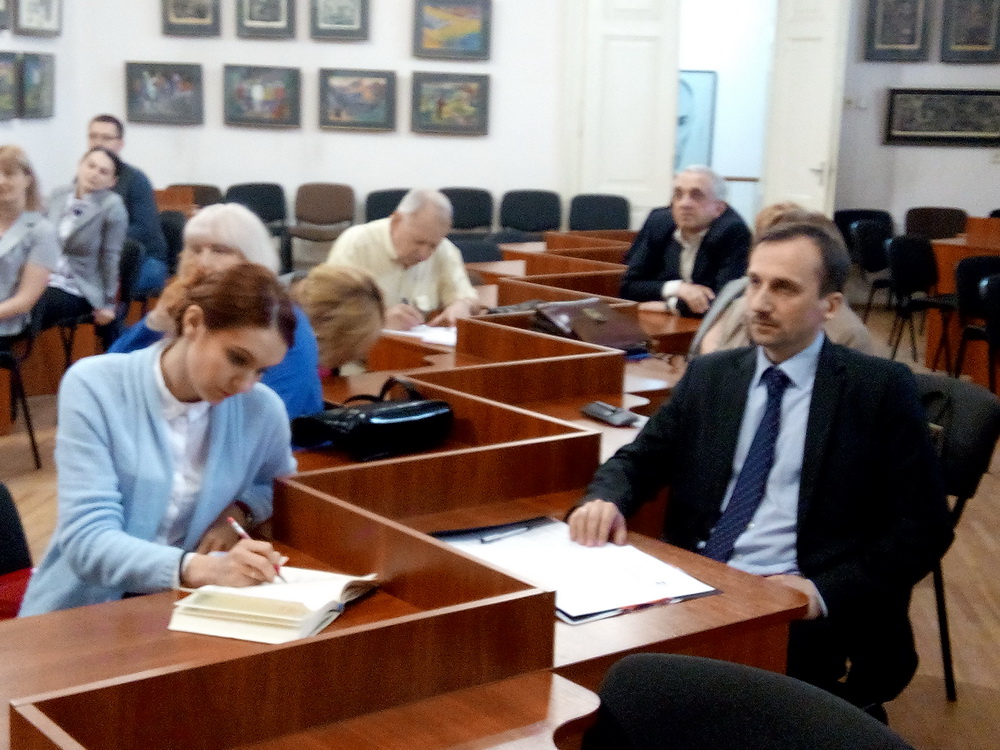
On behalf of the Education, Audiovisual and Culture Executive Agency (EACEA, Brussels) and in order to learn the best practice of the international credit mobility Erasmus+ (KA1) implemented by the Ukrainian universities-leaders of Erasmus+ projects for international credit mobility, the monitoring of Erasmus+ (KA1) was conducted at the University on May 19, 2017. The monitoring was conducted by Ivanna Atamanchuk and Kateryna Zhdanova, the representatives of the National Erasmus+ Office in Ukraine (Kyiv).
The meeting with the Vice-Rector for Research, Teaching and International Cooperation Mariya Zubrytska took place during the monitoring. Mariya Oleksiyivna emphasized on the importance of the University participation in Erasmus+ KA1 projects, told about the successful practice of partnership with foreign partners and shared her ideas of improving the organization of the academic mobility at the University and the necessity for implementing changes in normative documents regulating the academic mobility.
The Coordinator of the Erasmus+ Program at the University Oksana Krayevska told about the results of implementing Erasmus+ projects at Lviv university. At the moment of conducting the monitoring the University signed 42 Erasmus+ KA1 interinstitutional agreements with the partner universities from the European Union.
In general, from the beginning of implementing Erasmus+ KA1 projects 204 students, lecturers and administrative workers (78 persons during the second term of 2015/2016 academic year and 126 persons during 2016/2017 academic year (until May 1, 2017)) became the participants from the University. In the second term of 2015/2016 academic year 52 students became the participants of the projects: 28 undergraduate students, 16 Masters, 8 postgraduates, 17 lecturers and 9 administrative workers. During 2016/2017 academic year 95 students became the participants of the projects: 56 undergraduate students, 33 Masters, 6 postgraduate students, 21 lecturers and 10 administrative workers (until May 1, 2017).
The most active are the faculty of international relations, the faculty of foreign languages and the faculty of economics. However, there are the faculties that haven’t taken part in the programs of academic mobility at all.
The problems and perspectives of implementing the academic mobility at the University and ways of their solution were discussed during the meeting with the workers of the department of international relations and the Coordinators of academic mobility from the faculties. The meeting-interview with the students, postgraduate students, lecturers and administrative workers who had participated in Erasmus+ KA1 took place as well. The participants of academic mobility programs shared their experience in learning, teaching and training at the partner Universities and answered the questions of the representatives of Erasmus+ office in Ukraine.
Within the monitoring the meeting-interview with the students and the University representatives who had participated in the selection of projects to participate in Erasmus + (KA1), but had not passed by the results of contests was also held. The students shared their ideas of improving the implementation of the academic mobility at the University and clarified the perspectives of their participation in the future contests.
By the results of the monitoring the National Erasmus+ Office in Ukraine is preparing the report which will be given to the Education, Audiovisual and Culture Executive Agency (EACEA, Brussels) and Lviv university for review.